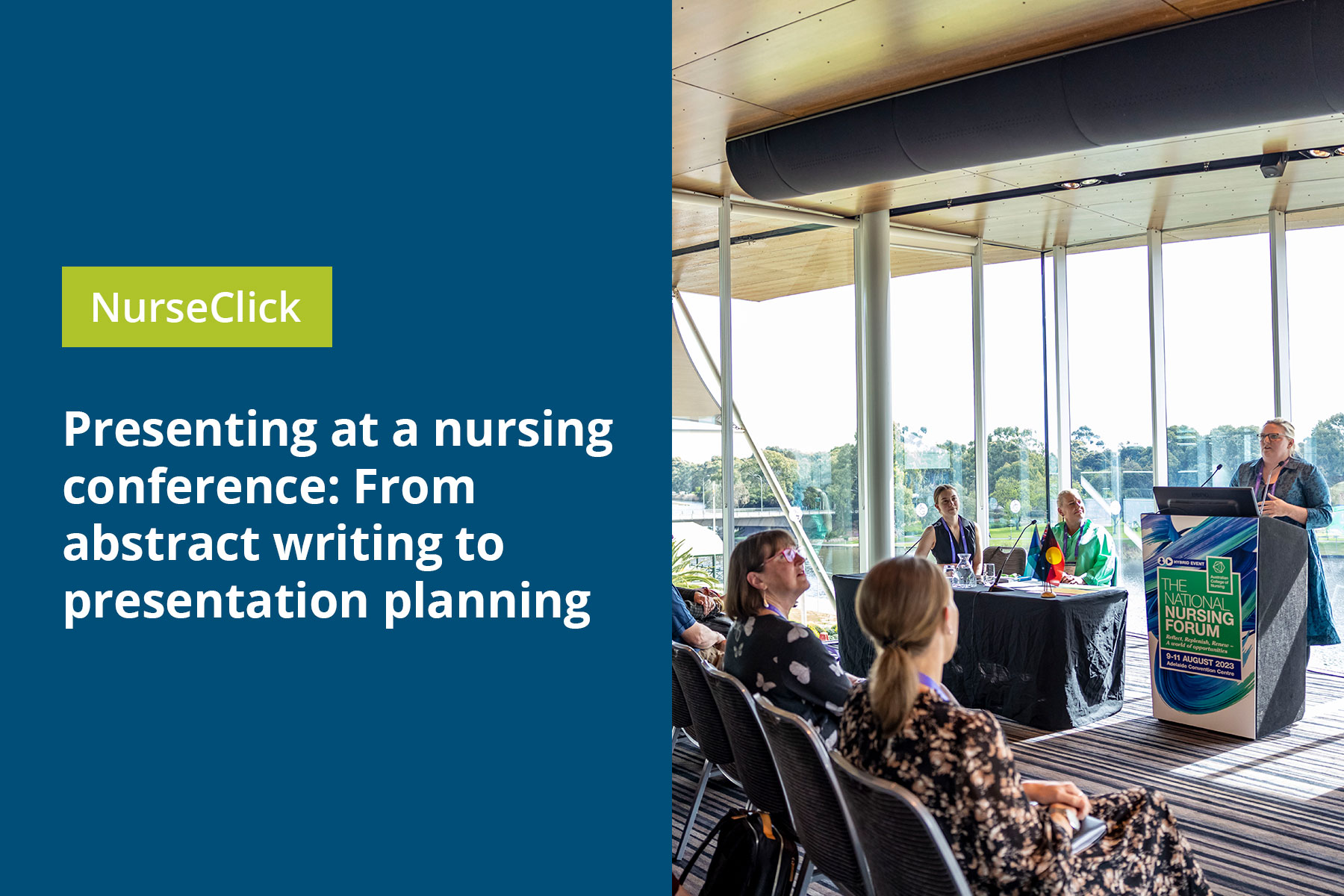Presenting at a conference, seminar or forum is a great platform for nurses to share innovative ideas and groundbreaking research. It also provides an opportunity to build your profile and showcase your visionary work. Whether you are an undergraduate, registered nurse, or even retired, these events give nurses the chance to share their learnings, insights, and stories by submitting an abstract for consideration as an oral or poster presentation.
In this article, we share tips on structuring your abstract in a way that not only meets the submission criteria but also showcases the significance and impact of your work.
Tips on structuring your abstract
- Give yourself plenty of time
Try not to leave it to the last minute. Give yourself plenty of time to read the submission instructions, gather your thoughts, and draft your abstract. - Review the guidelines
Adhere strictly to the abstract guidelines, including structure, format, and submission procedures. - Examine past abstracts
Review successful abstracts from previous forums and conferences. This can give you a sense of what resonates with the committee and audience, helping to shape your own submission. - Align with a key stream
Make your abstract relevant to the event by ensuring it relates to one of the conference’s key streams. - Select the title
The title should be no more than 10 words in length and clearly reflect the content of your abstract. - Plan the structure
Research-based papers should be structured to include an introduction/purpose, methods, results, and conclusions. All other papers should be structured to include an introduction, main body, and conclusion. - Keep it concise
An abstract is a snapshot of your complete work. Stick to a maximum of 300 words and ensure each word serves a purpose. - Review and revise
Edit meticulously for coherence, grammar, and accuracy. Remember, a polished abstract mirrors your professionalism. - Seek feedback
Have your abstract reviewed by a peer or mentor for constructive criticism. Fresh eyes can spot areas of improvement that you might miss.
An effective abstract is your ticket to sharing and discussing your valuable insights with your peers. Incorporating these tips will not only polish your abstract but will also enhance its impact, ensuring your voice is heard in the nursing community.
You’re abstract has been accepted – what next?
Congratulations! You have received notification that your abstract has been accepted – now what? It is time to start planning how you will best showcase your work through an engaging presentation. Here are some tips to get you started:
Planning a presentation
- Know your audience
At a nursing conference, there is a strong chance most of the audience will be health professionals. However, they may not be familiar with your specialty area, so make sure you explain key points and avoid using acronyms. - Be creative with your slides
We have all heard the phrase ‘death by PowerPoint’ and you do not want any casualties in your audience! Keep each slide focused on a single idea, concept or data point. Avoid overcrowding with excessive text and use engaging and relevant graphics. Remember the ol’ adage ‘a picture paints a thousand words’. A good general rule is one slide per minute. Therefore, if your presentation is 20 minutes, there should be no more than 18-20 slides. - Powerful opening
Begin with impact to grab the attention of the audience and set the tone for your presentation. I once did a conference presentation on ‘Finding your Tribe’ and I started by reciting the opening lines from the song Africa by Toto. The audience was not sure what was happening; I certainly had their attention. - Engage strategically
Use appropriate strategies to keep your audience interested. Ask questions, share anecdotes, or use props to enhance engagement. Never just read the slides. Make an effort to connect with audience members through meaningful eye contact. Use humour with caution, you do not want to risk offending anyone. - Memorable ending
Conclude with a key takeaway or a thought-provoking statement. This will help leave a lasting impression. After a keynote presentation I once gave on ‘Ethical Issues in Nursing’ I posed an ethical dilemma on the last slide and did not offer an answer or solution. I had people coming up to me for days (sometimes in the bathroom!) sharing their thoughts and opinions. - Practice, Practice, Practice
Rehearse your presentation multiple times and time it. Familiarise yourself with the content, slides, and any technology you will be using. No matter how thorough I know the content, I always handwrite what I am going to say. It helps overcome thought blocking and helps consolidate the narrative. - Relax and have fun
This is your time to shine. Getting nervous and anxious is normal, so channel that nervous energy into enthusiasm and passion. Remember, the audience wants you to succeed, and they are there to support you. - Reflect
After your presentation take time to reflect on your experience. Ask a colleague for feedback. What went well? What could be an area to focus and improve on next time. Because, no doubt, there will be a next time!
This article was originally published in the Winter 2024 edition of ACN’s quarterly member publication The Hive. Members can access all past editions of The Hive on MyACN. Non-members can get a sneak peek by viewing our open-access articles.
Author: Jennifer Harland MACN
Jennifer Harland has an impressive four decades of healthcare experience. Her career trajectory spans diverse domains, from clinical practice to academic pursuits, and from shaping policy to providing inspirational leadership. Her impact resonates across Government and Non-Government organisations in New South Wales, South Australia, and the Australian Capital Territory.
Jennifer’s commitment to education and training is evident through her academic achievements. She holds a Master of Science (Addiction), delving into the complexities of substance use and recovery. Her Master of Arts (Applied Ethics) reflects her deep contemplation on ethical dilemmas in health care. Jennifer has also completed Postgraduate Certificates in Intensive Care, Mental Health, Higher Education, and Emergency & Disaster Management. As Director of the Australian College of Nursing Institute of Leadership, Jennifer is supporting other nurses in their pursuit of excellence.






